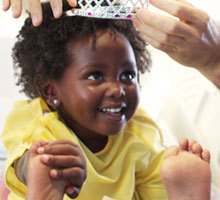Microtia Repair
At what age can microtia be repaired?
At around eight to ten years of age, the cartilage in a child’s ribs is robust and thick enough to produce a framework for reconstruction. It is also easier to actually harvest the cartilage graft in a larger child while avoiding a deformity of the chest wall. There is also a strong psychological reason for waiting. Post-operative care can be very difficult on the child and all those involved in their care. It is important for the child to be old enough to understand and personally “consent” to having the surgery. Even though some surgeons have started surgery in children as young as 5 or 6 years of age, we rarely encounter children requesting surgery at these ages but we frequently encounter parents requesting surgery on their children well before this. Having some patience, and waiting for the child to be physically larger and psychologically more mature results in a far better permanent outcome.
The advantages of waiting until a child is older allows for:
- Best symmetry in size with the opposite ear after complete growth
- Best symmetry in location of the ear in comparison to the opposite ear allowing for growth of the face and jaw
- Presence of a larger, more robust cartilage graft from the rib
- A more mature child who can consent and be an active participant in the decision for surgery and in the recovery period
Treating the hearing defect
Most children with microtia have some difficulty hearing on the impacted side, due to the absence of the ear canal and middle ear structures that allow sound to reach the inner ear. It is important to have close audiological follow up to check for hearing impact. There are several options for hearing amplification:
- Bone-anchored hearing devices
- Ear canal and middle ear reconstructive surgery
What are the long-term effects of microtia on my child?
The various effects of microtia are different for every child and every family. The good news is that most children with microtia grow up to have happy and productive lives. Concerns about not being able to hear from both ears should be discussed with your physician and/or audiologist, who may encourage hearing amplification or surgical reconstructive options. We encourage you and your family to have open discussions about it, knowing there are treatments options available if you so choose. Often we find that a child’s feelings about themselves mirror their parents’ or family’s feelings.





























